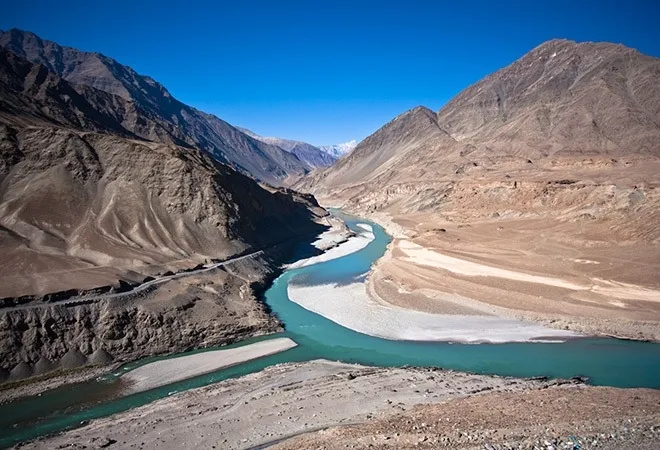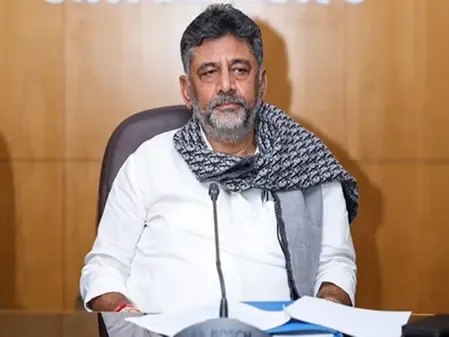How is India Skillfully Leveraging Lawfare in Suspending the Indus Waters Treaty?

Synopsis
Key Takeaways
- India's suspension of the IWT is a response to ongoing terrorism from Pakistan.
- International law principles justify India's legal stance.
- Countermeasures are a crucial aspect of international law in this context.
- Demographic changes and clean energy needs are central to India's rationale.
- The dispute resolution mechanisms under the IWT are currently in limbo.
New Delhi: Following the April 22 Pahalgam terror attack, India has skillfully leveraged international law to pursue its long-standing goal of curtailing Pakistan's support for terrorism. A detailed analysis of the rationale behind placing the 1960 Indus Waters Treaty (IWT) on hold illustrates New Delhi's application of lawfare—a term that refers to the strategic use of legal frameworks to achieve political aims—to combat Pakistan's backing of cross-border terrorism. Contrary to Pakistan's claims, New Delhi's actions are firmly rooted in the customary international law principles of clausula rebus sic stantibus and countermeasures.
The Vienna Convention on the Law of Treaties, 1969 (VCLT) serves as the foundational text for modern treaty interpretation. The customary doctrine of clausula rebus sic stantibus, outlined in Article 62 of the VCLT, applies to the IWT, allowing states to suspend, withdraw, or terminate treaty commitments due to fundamental changes in circumstances.
To invoke the doctrine of fundamental change, specific criteria must be met: First, the change must be objective, not merely a subjective shift in the invoking party's attitude. Second, as highlighted by the International Court of Justice (ICJ) in the Fisheries Jurisdiction Case, the change must be substantial. Third, the invocation of the clausula doctrine should occur within a reasonable timeframe. Finally, the change must be unforeseen at the treaty's conclusion.
The Indian government has informed Pakistan of its reasons for suspending the IWT, citing significantly altered population demographics, the pressing need for clean energy development, and changes in water-sharing assumptions as fundamental shifts motivating this decision.
India's rationale meets the necessary thresholds for invoking the clausula doctrine. Its argument is based on objective demographic shifts and clean energy demands, rather than a mere subjective change in attitude. The radical nature of these changes is evidenced by the rapid population growth in both India and Pakistan, alongside the urgent need for sustainable energy solutions amid significant climate changes. Importantly, neither New Delhi nor Islamabad anticipated these critical developments when ratifying the treaty in 1960. Regarding the reasonable timeframe, this is not the first instance of India highlighting demographic changes and clean energy needs; a notification was sent to Islamabad to review the IWT on August 30 of the previous year, but no response was received.
Although not explicitly stated, an alternative justification for India's response to the Pahalgam attack lies in the customary international law of countermeasures. Codified by the International Law Commission in the Articles of State Responsibility for Internationally Wrongful Acts, 2000, countermeasures are actions a victim state may adopt against a wrongdoer to induce compliance with international obligations. This aspect of international law allows victim states to enforce their rights and restore legal relations with offending states.
Countermeasures, while inherently wrongful, exempt the victim from fulfilling treaty obligations until the wrongful act ceases. Due to the potential for misuse, strict limitations govern countermeasures. Such actions must be reversible, temporary, and proportional to the injury suffered. Most importantly, they should be non-forcible, aimed at procuring cessation of the wrongful act and seeking reparations.
The Cabinet Committee on Security's careful language indicates that India is temporarily suspending its treaty obligations. New Delhi asserts that the IWT will remain in abeyance as long as Pakistan continues its support for cross-border terrorism, a persistent issue for India since the 1980s. While India's position appears unprecedented, it is not excessive given the 26 lives lost in the recent Pahalgam attack or other terrorism-related fatalities in India.
India's countermeasures also find support in international arbitral and judicial precedents. In the 1978 Air Service Agreements arbitral award, the tribunal acknowledged the victim state's right to implement countermeasures in response to violations of international obligations. Similarly, the ICJ reaffirmed this principle in 1997 during the Gabcikovo-Nagyamaros Project case, stating that breaches of general international law justify countermeasures. By fostering terrorism against India, Pakistan has engaged in an internationally wrongful act, warranting India's countermeasures.
The immediate fallout from suspending the IWT is the disruption of parallel dispute resolution mechanisms initiated by both nations regarding the Kishanganga and Ratle hydroelectric projects.
In August 2016, Pakistan raised concerns with the World Bank regarding the design features of India's hydroelectric projects and sought resolution through a neutral expert. Later, it withdrew this request and pursued adjudication before the Permanent Court of Arbitration (PCA). India's frustration stemmed from Pakistan's misuse of the IWT's procedural requirements, which dictate a graded approach to dispute resolution.
According to Article IX of the IWT, minor technical issues should first be addressed by the Permanent Indus Commission. If unresolved, the 'differences' or 'disputes' are referred to a neutral expert appointed by the World Bank. Should the neutral expert fail to resolve the issues, the case may be escalated to a court of arbitration.
When Pakistan approached the PCA without exhausting other remedies under the IWT, India requested the World Bank appoint a neutral expert in August 2016 due to unresolved disagreements over the hydroelectric projects. In 2023, New Delhi asked Islamabad to modify the IWT, but Islamabad declined to engage in discussions.
Currently, both the PCA and the neutral expert maintain their competence to address the issues raised by Pakistan and India, respectively. Consequently, two parallel dispute resolution mechanisms exist for the same matter: the PCA, initiated by Islamabad, and the World Bank's neutral expert, requested by New Delhi.
Thus far, India has refrained from participating in PCA proceedings, citing inconsistent outcomes. With the IWT's suspension, New Delhi is now considering how to withdraw from the neutral expert proceedings initiated in 2016, leaving the dispute resolution mechanisms under the IWT in a state of uncertainty.
The pressing question arises: Can Pakistan escalate the issue concerning the IWT's suspension? This appears challenging.
The dispute resolution framework established by the IWT does not mention the possibility of adjudicating differences before the ICJ. Instead, it outlines a graded system that necessitates submission to the Indus Water Commission, followed by a neutral expert, and ultimately a court of arbitration if unresolved. Given India's non-participation in PCA proceedings and intentions to exit the World Bank's neutral expert process, the treaty's dispute mechanisms are currently stalled.
Barriers regarding the ICJ's jurisdiction would complicate Pakistan's ability to initiate proceedings against India. The world court's jurisdiction over contentious matters hinges on state consent. India has made specific reservations concerning ICJ jurisdiction in certain cases. In one such reservation made on September 27, 2019, India declared it would not accept the ICJ's jurisdiction over disputes involving Commonwealth member states. This Commonwealth reservation was the basis for the ICJ's determination of lacking jurisdiction in the Aerial Incident case brought by Pakistan following the destruction of a Pakistani aircraft by India on August 10, 1999.
This situation leaves Pakistan with the option of seeking assistance from the United Nations Security Council, potentially with China's backing, to explore political avenues for condemning India. In such a scenario, India could rely on other Permanent Members of the Security Council to veto any resolutions critical of its actions.
By effectively employing lawfare as a strategic instrument to advance its political objectives, India has reaffirmed its stance that blood and water cannot coexist.
(The writer is a New Delhi-based international law researcher. Views expressed are personal)









